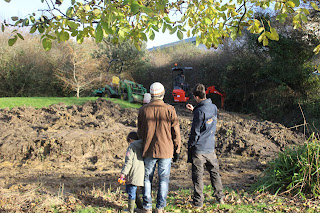Cornwall College Newquay held an employability event this week where students were able to boost their skills and knowledge in order to gain employment by attending an inspirational conference, taking part in mock interviews and hearing about their peers work experience placements.
 |
| Some of the huge range of work experience posters on display |
Marine Conservation student Joanna Harris from St Columb, initially gained her work experience as a volunteer with the National Lobster Hatchery, which led to a part-time position with Joanna gaining an impressive 390 hours of experience so far. Joanna said: “My role began by learning the basics of working in a visitor centre including meeting and greeting the visitors as they arrived, managing the gift shop, keeping the charities databases up to date and ensuring that visitors got the most out of their visit. I quickly learnt a lot about the National Lobster Hatchery and all the amazing work they do and, of course, all about lobsters so, I was soon able to answer any questions the visitors had as well a guide then around the visitor centre, sharing stories about all the wonderful exhibits.
“I love engaging with people and assisting with the public education aspect of the National Lobster Hatchery and it was brilliant to be part of such a hardworking and dedicated team. I gained a wealth of knowledge about the importance of marine conservation and especially the role of education. I learnt how to teach others in an informative and fun way so to be able to raise awareness about the importance of marine conservation and working in this role has further ignited my passion for it. I didn’t really have a clear idea of where I wanted to go with my degree but my time there has certainly given me focus for my future career.”
 |
| Marine Conservation student Joanna Harris |
Lecturers also posed as employers in mock interviews to show students what they should expect when they attend a job interview. As well as getting used to the kind of questions they might be asked, students were also encouraged to attend dressed as they would be in the real situation.
The culmination of the week was an Enterprise and Employability conference where special guest speakers offered their advice on gaining employment. Inspiring sessions were delivered on a range of topics linked to employability by organisations including Unlocking Cornish Potential, Volunteer Cornwall, Oxford Innovation, Fish for Thought, Sp
ezia Organics and Surfers Against Sewage.
(Videos of all the talks can be found on the Brighter Cornwall Facebook page- well worth a watch)
CLICK HERE
Recruitment and Talent Manager from Unlocking Potential Nicky Luke said: "Employability training is essential because students need to be thoroughly prepared to understand what is needed for them to successfully arrive at their ultimate choice of destination within the job market or running a business. Not all students are ready to actively engage in their futures when they are busy trying to pass their degree courses - but if they don't do so, they risk being unprepared and potentially unsuccessful in achieving their dream careers.
“The speakers were carefully selected representatives from charities and entrepreneurs who were able to demonstrate that their wealth of knowledge and experience and they managed to cut through the day to day pressures of studying and helped the students to generate the fire in the bellies that they will need to focus in on what they want to do, what they need to do to achieve it, how to generate opportunities and how to sell themselves. Their message was 'If I can do it - you can do it!' and students walked away from the event saying it was 'inspirational'. The event was delivered by Unlocking Potential as part of the Brighter Cornwall project, funded by Cornwall Council to provide work placement and networking opportunities for undergraduate students".
For more information about Zoology, Marine and Surf Science courses at Cornwall College Newquay please visit www.cornwall.ac.uk, call 0845 2232567






















